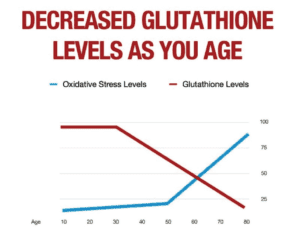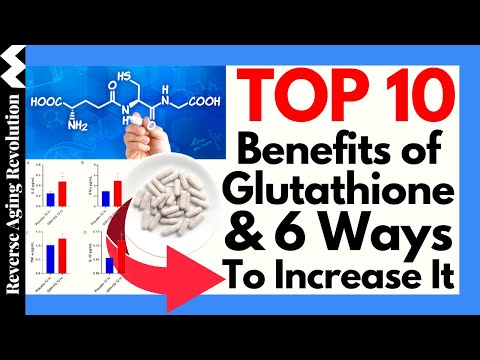I also did the calculations, and agree with you that 7g glycine and 9g NAC (not cysteine, a component of NAC) is what they used for a 70kg person.
The Baylor study used 71-80 year olds, whille this one averaged 65 years old. It could be a crucial difference.
Don’t get me wrong. I am a believer in glycine and NAC supplementation. Not just believing I need a GlyNAC supplement as opposed to my regular supplementation with glycine and NAC.
Are there any reasons NOT to take GlyNAC?
Could there be detrimental effects of taking GlyNAC before age 45? And… why 45yo? I understand that “there is a continuous, linear increase in oxidative events throughout adult life but that the capacity of the GSH antioxidant system is maintained until 45 years and then declines rapidly”. But shouldn’t the decision be based on your GSH levels (or whatever other relevant tests) and not an arbitrary age limit? What would be the threshold to start GlyNAC supplementation? At which dose?
It may have a nuanced impact re cancer.
Brad picked 45 yo to start as Glycine and Cysteine both suffer noticeable enough drops starting at around 30 that impacts GSH significantly. Starting at 50 yo, ROS shoots up due to a lack of GSH. So he’s adding a 5 year buffer to be careful. These are averages after all.

Thanks. How can I measure my glutathione levels? I could only find Glutathione Peroxidase and Glutathione Reductase tests and I don’t know if they do the job.
See video below for testing info.
NAC almost certainly works against rapamycin.
Here it is nullifying the effects of mTOR inhibitor Ashwagandha.
Here it is completely nullifying the life extension gains of mTOR inhibitor glucosamine.
I also found another study in which rapa was found to block the effects of NAC (and I’m guessing vice versa) but can’t currently find it.
So if people want the benefits of mTOR inhibitors they either have to time their NAC intake very well or ditch it from their program IMO. I’m going with the latter because there’s little evidence outside of Baylor (who have a patent on glyNAC) that raising glutathione levels has any life extension benefits. It’s a theory. Raising NAD+ levels that decline with age is a theory too. NR failed to achieve anything in the ITP though so much for that one.
Here’s the paper I was looking for WRT rapamycin. Its conclusions aren’t positive for thiol antioxidants like NAC.
Where do those links show that NAC nullifies Ashwagandha and Glucosamine?
It does appear that NAC and glutathione do affect rapamycin-induced autophagy. That’s good to know and I will skip NAC on the day of my Rapamycin dose and the day afterward. Thanks for that.
NAC has a half-life of 6.25 hours, so a dose of 3.2 g should be cleared within a day.
As for glucosamine, I take it to relieve knee joint pain which it does even while I am on NAC. When I stop taking it, the knee pain comes back. So, the beneficial effects on my knees (which is why I take it) are not affected by GLYNAC.
I don’t take ashwagandha, so I’m unconcerned about that. When you look at the effects of increased glutathione on cognitive ability, it’s a solid choice. I guess it’s another timing issue. But it’s better to be aware of this sooner rather than later.
NAC has had many beneficial psychological effects that I enjoy, so I will continue taking it. But I will try to avoid it around when I take Rapamycin. Thank you.
Fair enough. I’m struggling to find a place for it myself because I cycle between AMPK upregulators/mTOR inhibitors (everolimus, astaxanthin, aswhwagandha, glucosamine) around aerobic training days to maximise autophagy and mTOR activators (tongkat ali, betaine, beta alanine, glycine) around resistance training days to maximise muscle synthesis.
NAC is actually a mTOR inhibitor that also inhibits autophagy (the whole point of taking a mTOR inhibitor) so it’s a weird one and very hard to fit in with my goals. FYI asta, gluco, ash and good ol’ fashioned whey protein all boost glutathione too. For that reason I can go without NAC I think.
Thanks a lot for your interesting insights on NAC; I didn’t know about it, and it’s indeed something to take into account.
Just a comment on this: I agree with you that, at this stage, raising NAD+ is just a theory. Still, the failure of NR in the ITP might be due to the dose (too low) and the starting time (too soon, 8 mo, so 20 yo for a human?). That’s why I guess they’re trying it again at a higher dose, later in life (20 mo, so 50 yo for a human?), and this time combined with metformin: Supported Interventions | National Institute on Aging
NP
ON your point, yes it’s absolutely possible the failure of NR and metformin was a dosing issue and I welcome the ITP having another go but until studies (by a reliable and neutral ream) show benefit, I think it’s best to assume they don’t work. Because the prior probability of most anti-aging interventions is that they don’t work.
Rajagopal V. Sekhar M.D., the leading researcher behind GlyNAC studies, just got back to me:
I appreciate your interest in our studies. GlyNAC has already been selected for evaluation in the ITP program. PD is definitely an interest, but a little later as we are busy with ongoing trials.
Great. Looking forward to seeing how it gets on. If it’s successful I’d like to see it tested with rapa too. It’s possible they can both extend life individually but cancel each other out together.
Great indeed. Also, the Baylor team must be confident in their findings to push it to the ITP. Otherwise, it would be a total disgrace for them if it fails. It can still fail, of course, but I assume that at least they’re honest in their research. On the other hand, this reminds me of selegiline/deprenyl. I contacted the lead investigator of the recent paper six months ago and again last month, and they never got back to me. My guess: they know that selegiline does not extend lifespan and that previous studies were incorrect. (Or my email went to their spam folder ![]() )
)
I recently listened to a podcast in which a researcher was touting the many benefits of collagen supplementation. But one benefit I hadn’t considered is IF one is eating a heavily animal protein diet (as I am) then having excess glycine is useful to counteract the excess methionine (which is pro aging) and pushes the cycle into glutathione production. I would gather having NAC as well would additionally help here. The suggestion was for roughly 12-15g of glycine daily for meat eaters, of which he thought roughly half could come from collagen supplementation and the rest from glycine supplementation. I haven’t seen research on this, but if excess methionine is the root cause of lower lifespan from higher meat consumption, then this could ameliorate this issue (at least partially). The below article discusses that higher methionine diets show correlation to CVD events. This may also be a reason that glycine supplementation can extend lifespan.
I’m taking 6g of glycine with 100mg NACET and 28g collagen in the morning. Then I eat a heavily animal-protein low-carb diet. Hopefully the glycine is counteracting the methionine.
